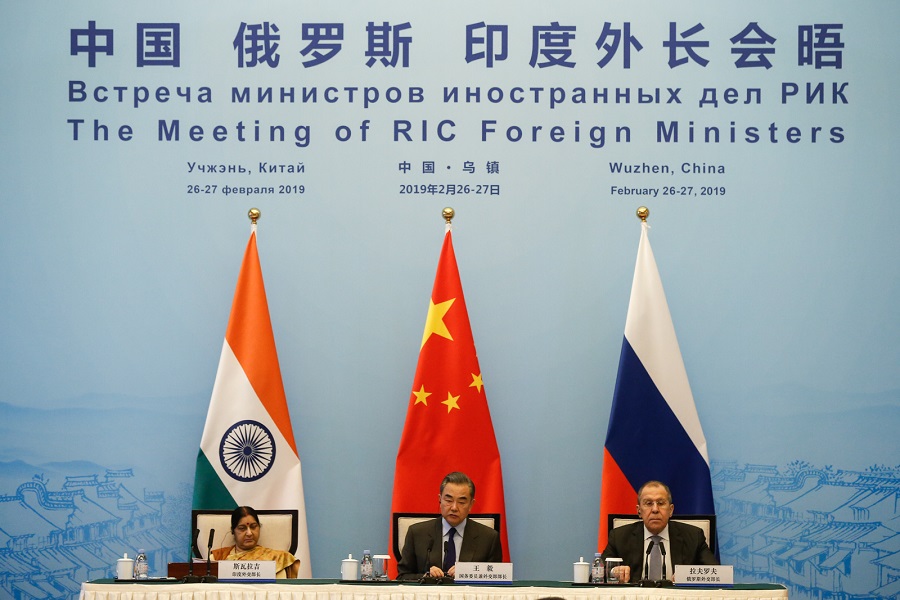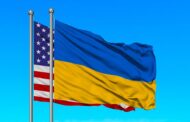V čínskom Wuzhene sa 27. februára uskutočnilo stretnutie ministrov zahraničných vecí Ruska, Indie a Číny. Ministri sa dohodli na posilnení koordinácie a vzájomnej spolupráce a vyjadrili podporu multilateralizmu s pevným miestom OSN v rámci medzinárodných vzťahov. Zdôraznili význam nezasahovanie do vnútorných záležitostí jednotlivých krajín a odmietli protekcionizmus a jednostranné riešenia a prístupy. Podporili posilnenie spolupráce v boji proti terorizmu. Dohodli sa na pokračovaní tejto trojstrannej spolupráce aj na najvyššej úrovni a úrovni ministrov obrany.
Publikujeme prijaté spoločné komuniké ako aj tlačovú konferenciu S. Lavrova
* * *
Komuniké na stiahnutie dostupná tu: Joint-Communique-RIC-27-02-2019
* * *
Foreign Minister Sergey Lavrov’s remarks and answers to media questions at a joint news conference following talks between RIC foreign ministers
Wuzhen, February 27, 2019
______________________________________________________________________________________________________________________________________
Ladies and gentlemen,
It is the 16th time that the foreign ministers of Russia, India and China (RIC) have held this meeting. Today we met in this wonderful part of China, where we enjoyed a warm welcome and hospitality of our hosts, to exchange opinions on the current global and regional topics, following on the results of an informal meeting the leaders of Russia, India and China held on November 30, 2018, on the sidelines of the G20 summit in Buenos Aires.
We note with satisfaction that our positions are similar or identical on the most important and fundamental topics.
We hold similar views on the global developments that are related to the rise of a more democratic and fairer polycentric world order based on mutual regard for each other’s interests, broad international partnership and respect for the specific cultural and civilisational features of the world’s nations.
We spoke out in favour of strict compliance by all countries without exception with the fundamental principles of the UN Charter, including respect for the sovereign equality of states, non-interference in the internal affairs of others and non-use or threat of force. We expressed our grave concern about the striving of some countries to undermine the existing system of multilateral institutions and to replace international law with a “rules-based order.” We pointed out the counterproductive nature of the attempts to destroy basic agreements in the field of global security and strategic stability and to call into question the internationally recognised framework for settling crises and conflicts.
We agree with our Chinese and Indian partners that our efforts within the framework of RIC to formulate and promote a constructive international agenda are especially important in the light of current global developments.
We have agreed to continue to coordinate our positions at the UN, G20, BRICS and the SCO, as well at the multilateral platforms in the Asia Pacific that are taking shape around the ASEAN nations.
We expressed our concern over the current dangerous trends that are unbalancing the multilateral system of global trade, the increased application of protectionist measures, trade wars and an increasing practice of illegal unilateral economic sanctions adopted in circumvention of the UN Security Council. We believe that all states must have equal opportunities as well as fair conditions to take part in global economic activities.
We pointed out the need to step up the common efforts of the RIC countries in the fight against the terrorist threat and the proliferation of the extremist ideology and drug trafficking. We held an in-depth discussion on international cybersecurity, highlighting the special importance of two resolutions adopted at the 73rd UN General Assembly: Developments in the Field of Information and Telecommunications in the Context of International Security and Countering the Use of Information and Communications Technologies for Criminal Purposes. Talks are to be held at the UN on these resolutions, which were initiated by a group of countries, including Russia.
We talked at length about the crises in Afghanistan, the Korean Peninsula and Venezuela, as well as about the non-proliferation of weapons of mass destruction, including in the context of the Joint Comprehensive Plan of Action on the Iranian nuclear issue. We exchanged opinions on the situation in the Middle East and North Africa, including the Palestinian problem, Syria, Libya, Iraq and Yemen. I updated my colleagues on the Sochi summit of the guarantor countries of the Astana Process on Syria held on February 14. We are grateful to our Indian and Chinese friends for the high appreciation of that event.
We have agreed to discuss the expansion of our trilateral cooperation to new cooperation spheres and avenues that are of mutual interest. In particular, we spoke about the merits of contacts between the secretariats of the national security councils and financial intelligence services, regular meetings of the members of our academic communities and youth forums. The next RIC youth forum will be held in Russia in 2019.
As Member of the State Council and Foreign Minister of China Wang Yi has said, we also discussed the possibility of initiating the meetings of our defence ministers.
All the results of our consultations and talks have been incorporated and expanded upon in the Joint Communique, which will be posted later.
We will report to our leaders on the work we have done today. We will propose holding another informal meeting of the RIC leaders on the sidelines of one of the upcoming multilateral events.
It has been already announced that Russia will host the next meeting of the foreign ministers of Russia, India and China.
Question: The Russian Security Council reported that American military equipment and special forces have been sent to countries bordering on Venezuela. What steps is Russia taking or planning in response? According to the Security Council, that could potentially mean an upcoming intervention. What comments would you make on Washington’s reaction to Moscow’s warnings about a military intervention being unacceptable?
Sergey Lavrov: We are closely following the reports on what is really going on there. We see some completely shameless attempts to artificially create a pretext for a military intervention; we can hear direct threats from Washington that all the options remain “on the table.” There is a confirmation to the threats you have just mentioned – military equipment sent and special forces exercising. At the same time, we also note the continuing provocations aimed at breaking through the border under the pretext of delivering humanitarian aid and on the expectation of casualties. That, in keeping with a well-tested scenario, will be followed by hysterical screams and an attempt at a militarily intervention.
We are actively working with all countries that are concerned as we are over the prospect of a military solution. It is no accident that the leadership of Brazil declared that they would neither participate in nor provide their territory for an American aggression against Venezuela. I have not heard similar statements from the leadership of Colombia yet, but maybe I have missed something. I proceed from the assumption that not a single South American country, including all members of the Lima Group, who actively support the holding of early presidential elections in Venezuela and support the head of the National Assembly, Juan Guaido, has expressed support for a potential military intervention.
It seems to me that the US should heed the opinion of the region’s countries. First of all, we recommend concentrating on the ideas contained in the Montevideo Mechanism formulated by Uruguay, Mexico, and the Caribbean Community countries, which implies holding a nationwide dialogue with the participation of all political forces. President Nicolas Maduro has repeatedly expressed his readiness for such a dialogue. Unfortunately, Juan Guaido and his entourage reject such proposals and demand that their ultimatum on holding early presidential elections be met.
Yet another disturbing circumstance is that Washington, encouraging members of the country’s leadership to state in public that the days of President Maduro are counted, says directly that Cuba and Nicaragua will be next. That is, the Monroe Doctrine, which implies that the Americans should not allow anyone to sneak into South America, is paling before the doctrine that is taking shape right before our eyes. This doctrine means that the Americans are arrogating the right to use force wherever they please to overthrow regimes that for some reason they are not happy with. It goes without saying that international law will be undermined. The Americans are trying to replace it with the notorious “rules-based order.” You can guess what rules the United States has in store for the Latin American region.
I really hope that all countries committed to the UN Charter will raise their voice to say that such an approach is unacceptable and will insist on the necessity of a nationwide inclusive dialogue. Venezuela’s problems can be solved solely on the basis of the principles enshrined in the UN Charter, such as the sovereign equality of states, respect for sovereignty and territorial integrity, inadmissibility of interference in internal affairs, or just everything stipulated in this crucial international legal document. It is not accidental that the Venezuela section of the statement we have formulated today demands that this problem be solved on the basis of the UN Charter, which must be respected by all countries without exception, including the United States.
Question: You have long made it a rule to meet in this trilateral format. Are there any plans to organise a meeting of heads of state or defence ministers in the same format?
Sergey Lavrov: We have already released information that we have agreed to consider the possibility of developing mechanisms for meetings of the three countries’ defence ministers. We will recommend that our leaders hold another informal summit on the sidelines of one of the upcoming multilateral events, where all the three leaders will be present.
* * * * *
Zdroj a ilustračné foto: http://www.mid.ru/ru/press_service/minister_speeches/-/asset_publisher/7OvQR5KJWVmR/content/id/3547249?p_p_id=101_INSTANCE_7OvQR5KJWVmR&_101_INSTANCE_7OvQR5KJWVmR_languageId=en_GB







